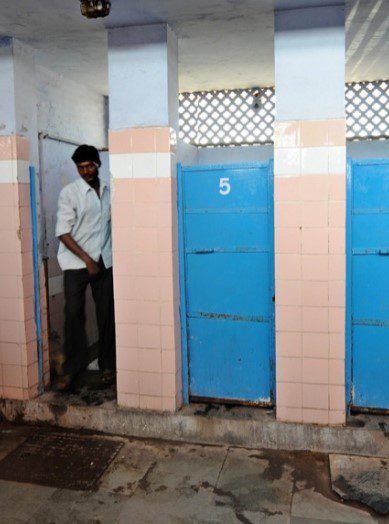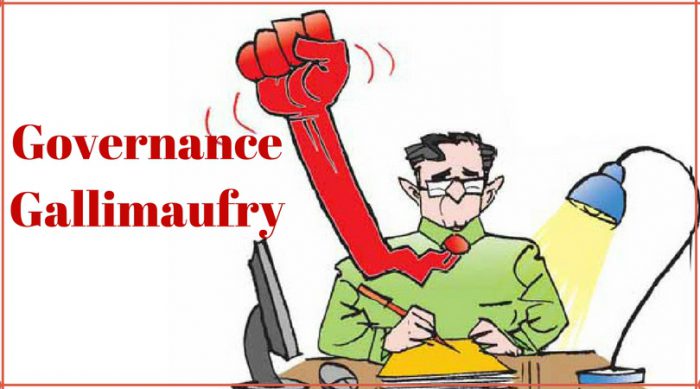There are no proper women’s toilets at public places. Will it sound very odd if we start an agitation for proper lady’s toilet, now? We live in a world where women may be raped, molested right after her birth up to any age. Dignity, decency, care, kindness, concern, love need to be taught to the human race and a movement for the right to pee would be a rude reminder to all where we stand today, agonises Hemashri, in the weekly column, exclusively for Different Truths.
Who was the first man or woman who advocated that women should go out of her home to earn a living? One reason why a woman cannot be a man is the way they were designed by God. An average man needs no privacy to attend the call of nature, unlike a woman.
Every time a woman goes out, one of her greatest inconvenience is lack of proper toilet facility. Two designated areas of a home indicate the family’s decency and culture – toilet and kitchen. Proper hygiene of these two places has a tremendous impact on health and wellbeing. Similarly, perhaps a society or community’s culture gets reflected in the status of its public toilets.
Ten years back I was working as an officer on special duty (OSD) in a huge government department in the state capital. We had washrooms made for women but no proper indicator or signboard. Often, I would discover men inside those toilets who had to be sermonised that for relieving men and women are not supposed to use the same facility.
That department was the most litigant department with too many court cases and my primary preoccupation was to attend court matters. One day I was in a terrible hurry to send some urgent papers  to court. As I hurriedly rushed to the lady’s convenience, I found a man inside. Enraged by his lack of decency, I dragged him out of the toilet and gave him a tight slap. Minutes later when I was called in by the boss to place the court papers, I told him about the incident and requested him to kindly ensure proper toilets for us, ladies.
to court. As I hurriedly rushed to the lady’s convenience, I found a man inside. Enraged by his lack of decency, I dragged him out of the toilet and gave him a tight slap. Minutes later when I was called in by the boss to place the court papers, I told him about the incident and requested him to kindly ensure proper toilets for us, ladies.
My soon to be retired elderly, wise, the boss was shocked to know that I had slapped a man. He expressed no concern for our toilets and asked me several times whether I was sure that I had slapped a man. His total lack of concern for our problem infuriated me so much that I told him, “Sir, I assure you I did slap a man found inside the lady’s toilet. He violated my dignity. Further, I confess before you this is not the first instance of this kind. I am a history-sheeter!” One day I found inside the lady’s toilet, a security man with his walkie-talkie. I locked the door from outside. The locked in man shouted for help and maybe in frustration he opened all the faucets. I then took a Grade IV employee to open the door and found that the man had jumped out through the ventilator of the toilet.
One day, just before an urgent meeting, I went to the toilet and found the door locked from inside. After waiting for about 15 minutes when the door was still locked I lost my patience as the meeting was about to start. I thought since these men are always found inside lady’s toilet why in an emergency I cannot use the man’s toilet. I slipped into the man’s toilet and locked it from inside thinking I will be out within a few minutes. Within two minutes someone started banging the door loudly and was shouting, “It must be some woman inside, otherwise why someone would close the door.” The man started banging the door real loud. I was horrified and rushed to the door to press against the door in a desperate attempt to support it so that the lock does not break. I felt such a shock thinking if this lady’s toilet activist is discovered inside a male urinal what could be more insulting! The frustrated man went away and I rushed out of it. I promised myself never again to attempt misadventure.
Talking to several lady colleagues, I came to know everyone is enduring the same crisis. So we drafted a  toilet representation and got it signed by around 30 women officers. With two colleagues we placed it before an IAS officer. The man seemed very amused rather than being concerned.
toilet representation and got it signed by around 30 women officers. With two colleagues we placed it before an IAS officer. The man seemed very amused rather than being concerned.
Next day, my colleagues and I were provided locks with keys to keep the toilets locked. The man instead of attending to our problem to arrange proper display board indicating lady’s toilet and arrangements to ensure proper hygiene entrusted the two toilet activists the additional responsibility of a toilet guard.
Now, after ten years, the hygiene of the toilets have improved a lot but the menace of male invasion continues. The reason is that common sense is uncommon here. The tiny display boards are placed high above the door and a person with an emergency might never look up that high. Thus, these unpleasant encounters continue.
Sometimes back I was on a field duty during a religious event where lakhs of devotees gather. I noticed the lady police constable was standing very awkwardly as if she had difficulty in standing. I asked her, “Are you unwell?” She replied, “Madam, no toilets to go for seven hours. I am feeling sick.” I felt very sad realising her pathetic condition. I asked her to go to the nearby toilet, which was a little far away. I faced the same problem and I went to a nearby house and almost forcibly entered their toilet showing my identity card.
Many years ago, I was working in an outline subdivision. One day in the middle of the hearing of a CRPC case, I had to go to the toilet. I discovered a man inside the lady’s toilet. I locked the toilet from outside and thought of informing the caretakers. Due to the presence of advocates and my preoccupation with the case, I forgot the issue. The next day, it suddenly struck me that I had locked someone inside the lady’s  toilet. I felt mad at my carelessness and rushed. I found the door open leaving a displaced lock hanging loosely. I felt a great relief and felt ashamed of my stupidity and thanked the man and Gods in the heaven.
toilet. I felt mad at my carelessness and rushed. I found the door open leaving a displaced lock hanging loosely. I felt a great relief and felt ashamed of my stupidity and thanked the man and Gods in the heaven.
However, the most modern and futuristic models of urinals, I had noticed in the Economics Department of Guwahati University as a postgraduate student in mid-1990s. All my classmates can testify it and would agree. There was one common door to enter toilets meant for ladies and gents. Needless to say, we had many embarrassing, awkward moments and quoting those here would degenerate it to another category of literature classified as pornography.
A few days back, it happened again. I bumped into a man inside the lady’s toilet and I was about to be robbed of my modesty. The man told me he had an urgency and he could not make out whether it was man’s or woman’s toilet. He seemed to be a grade IV employee from some far-flung place. I assured him that I understood his problem and assured him it is perfectly okay here. I requested him to pose for a snap and he obliged smilingly. Strange are the ways of the world and we believe in being the strangest. So this time, my experiment is to click a memory of such encounters. When we cannot stop a menace, we should make stories – that’s my latest philosophy.
In some parts of the world, women had to fight for women suffrage or women’s right to vote. In 1881, the  Isle of Man gave women who owned property, the right to vote. That was the beginning but today in every country women can vote. Maybe this country now needs a movement to bring a positive change to make everybody realise that women need clean, hygienic toilets everywhere, not just in the airports.
Isle of Man gave women who owned property, the right to vote. That was the beginning but today in every country women can vote. Maybe this country now needs a movement to bring a positive change to make everybody realise that women need clean, hygienic toilets everywhere, not just in the airports.
Women never get their dues without asking, at least in this country. Will it sound very odd if we start an agitation for proper lady’s toilet, now? We live in a world where women may be raped, molested right after her birth up to any age. Dignity, decency, care, kindness, concern, love need to be taught to the human race and a movement for the right to pee would be a rude reminder to all where we stand today!
Jago (awake), India Jago, please don’t Bhago (run, abandon) from the basic issues, which actually does not even deserve to be uttered. Let’s start from the fundamental issue – proper toilets at every place – be it our schools, colleges, offices or public places. Maybe it will take forever to hope to live in a sensitised world. Let’s begin here and now.
©Hemashri Hazarika
Photos from the Internet
#RightToPee #WomenDignity #PublicToilets #IndianPublictoilets #RightToPeeForWomen #NoProperToiletsForWomen #Government #GovernanceGallimaufry #DifferentTruths






 By
By
 By
By

Truly said.Even last 3 years I facing the same problems in office .Always there is a que for toilets even You are in hurry.I met so many days male persons in ladies toilets even there is written for ladies..I really wish we will get proper toilets for us as earliest for each Department..
Mam ..Its really appreciate that’s u writing about the most important trouble for all of us..Thanks a lots..!!